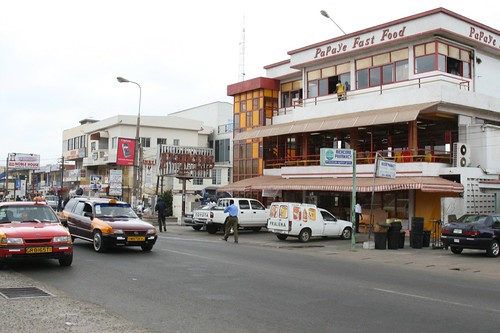Guarded Friendliness, also known as The Trouble With a Walk to the Bank
Just like in most study abroad experiences, there are good days and bad days in Ghana. (Today was actually a good day, but I still feel the need to write about this.) There are great days where you go out into Accra or beyond (especially beyond) and get the feeling that you are really seeing Africa, and that you get it. But there are also bad days, days when the water doesn't run, the food makes you sick, or too many men pester you with marriage proposals. It is the last of this list that I want to try to explain.
In Africa, or at least in my experience in Accra, you learn to approach certain people and situations with a sort of guarded friendliness. It is a reflection of the economic situation in Africa that there are many unemployed men that have little better to do than sit around on the sides of the streets, and these are the people to avoid. It is certainly easier if you are a guy, and easiest when you are with Ghanaians, but for a white female walking down the street alone, just getting to the bank (or grocery store or anywhere else) and back can be quite an ordeal. Especially in an affluent district like Osu, all white people are assumed to be rich, and there is never a shortage of people who want to sell you things or simply ask you for money (or declare their love for you). People will approach you with "hello, what's your name?" which seems rude to ignore, but this "conversation" will get to "have a look at my jewelry" or "please, give me money" in about 2 minutes. Really less. If they don't have anything to sell, they want to "be your special friend," they ask for your phone number and say "when can I see you again?"
And it's incredibly frustrating, not because I can't say no, but because outings like this, especially when I am alone, force me to put on a mask of guarded friendliness in which every gesture, facial expression, and word has to be chosen to make me seem unapproachable. But when someone does approach you, it rarely works to completely ignore them. The trick is to be friendly and polite while still preventing the conversation from continuing. It's a tough balance to keep, but there are ways.
Body language helps a lot. You can say "no" as much as you want, but it won't help if your body language is open for interaction. For example, I learned from a Nigerian friend here to wave instead of shaking the hand that someone holds out. She says she does it because you never know where a hand has been, but it also serves as a way of keeping yourself separate from someone you don't really want to talk to. You can wave and keep walking, instead of being pulled into a conversation. It helps a bit to smile too, but I think the most important thing is to keep walking, and to look like you know where you are going (which I do now!). I've also heard advice to say "not today" or "maybe next time," something to that effect. It isn't as effective as I might have hoped, but it is probably the easiest thing to say, rather than explaining that you are a student without much money, etc. etc.
The worst part about this, as I said, is not that it is difficult to get out of certain interactions. Sometimes men are really persistent, especially when it's just girls, but I have not yet been in a situation where I really felt in danger. (But some other girls in my program have had much more physical run-ins with guys on the street. One of my friends basically got groped in this really busy market-place, and turned around and yelled at the guy. I like to think that my "New York face" has some effect, but maybe I've just been lucky.) The worst part is that it makes you wary of any new person you meet. They might not even be "new" - a student I met once might not be familiar to me, but of course they recognize the blonde girl. Even walking around in our neighborhood in the afternoon can be challenging - I usually err on the side of friendliness, because even if I cannot recognize someone, they are most likely a neighbor or shop owner, and at any rate there aren't really any street hawkers in Labone. But there is also a palm wine "spot" (i.e. benches of unemployed drunk men) on the walk home from school, which can be a little scary at night.
I don't want anyone to worry about me. Even when you are new to Accra, the worst that usually ever happens is that you give out your phone number or cash to too many people, which really just results in being broke and getting lots of annoying phone calls. The toll of these types of interactions is more emotional. It's getting your personal space and security violated, it's hating the way you have to be rude to strangers, it's feeling like you always stand out. And it can make the difference between a good and bad day here.
PHOTOS: (borrowed from the web) Oxford St. in Osu




